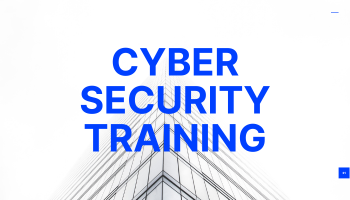Your cart is currently empty.
Cybersecurity, is the practice of protecting computer systems, networks, programs, and data from digital attacks, theft, damage, or unauthorized access. It encompasses a broad range of technologies, processes, and practices designed to safeguard information and ensure the confidentiality, integrity, and availability of digital assets. Cranesoft provides the best Cybersecurity Training in Bangalore.

Online-Classroom
3 Months Duration
Live Class Facilities
Interviews Assured
Live Server
Introduction to Cybersecurity for Aspiring Students: Welcome to the exciting world of cybersecurity! In an era dominated by digital technologies, the need for skilled professionals to safeguard our virtual realms has never been more critical. As you embark on the journey of cybersecurity training, you're delving into a field that is at the forefront of protecting information, networks, and systems from an ever-evolving array of cyber threats.
What is Cybersecurity?
Cybersecurity, short for "cybersecurity," is the practice of defending computer systems, networks, and digital data from unauthorized access, attacks, or damage. It is a multidisciplinary field that requires a deep understanding of technology, human behavior, and the strategies employed by those seeking to exploit vulnerabilities.
Why is Cybersecurity Important?
In our interconnected world, where information is the currency and technology is the conduit, cybersecurity plays a pivotal role. Every day, individuals, businesses, and governments rely on digital systems to communicate, transact, and store sensitive data. Cyber threats, ranging from hackers and malware to sophisticated cybercrime organizations, pose real and pervasive risks to the confidentiality, integrity, and availability of this information.
Your Role in Cybersecurity:
As future cybersecurity professionals, you'll be on the front lines of defense, ensuring the resilience of our digital infrastructure. Your responsibilities may include identifying and patching vulnerabilities in software, setting up secure network architectures, monitoring for unusual activities, and responding effectively to security incidents. Essentially, you become the guardians of the digital realm, protecting against cyber adversaries and ensuring the trustworthiness of the technologies we depend on.
A well-structured and up-to-date curriculum covering key aspects of cybersecurity, including network security, application security, cryptography, incident response, and more.
Practical, hands-on training that allows students to apply theoretical knowledge in real-world scenarios. This could include simulated cyber-attacks, labs, and projects.
Experienced and certified instructors who can provide insights into the industry, share real-world experiences, and guide students effectively through the complexities of cybersecurity.
Preparation for industry-recognized certifications, such as CompTIA Security+, Certified Information Systems Security Professional (CISSP), Certified Ethical Hacker (CEH), etc.
Exposure to the latest tools and technologies used in the cybersecurity industry, ensuring that students are familiar with the tools commonly used in the field.
Opportunities to network with professionals and experts in the field, possibly through workshops, seminars, or guest lectures.
Job placement assistance, which may include resume building, interview preparation, and connections with potential employers in the cybersecurity industry.
Flexible learning options, including in-person and/or online classes to accommodate different learning preferences and schedules.
Ongoing support after the training, including access to resources, forums, or communities where students can continue to learn and stay updated on industry trends.
Positive reviews and a good reputation within the cybersecurity community. Researching and reading reviews from previous students can give you insights into the quality of the training.
Via Security Analyst, Monitor an organization's computer systems and networks for security breaches. Analyze security data and develop strategies to protect against potential threats.
Via Penetration Tester (Ethical Hacker),Assess the security of computer systems, networks, or web applications to identify vulnerabilities. Conduct controlled attacks to simulate real-world cyber threats.
Via Security Consultant,Advise organizations on how to protect their information assets. Conduct risk assessments, evaluate security policies, and recommend improvements.
Via Incident Responder,Respond to and manage security incidents, such as data breaches or cyber attacks. Develop and implement incident response plans.
Via Security Engineer,Design and implement security systems and measures. Work on the development and deployment of security technologies.
Via Security Architect,Plan and design the overall security architecture of an organization. Ensure that all components of the system are secure and aligned with business goals.
Via Security Manager/Director,Oversee the entire cybersecurity program within an organization. Develop and implement security policies, standards, and procedures.
Via Cryptographer,Develop and implement cryptographic solutions to secure data and communication. Work on encryption algorithms, key management, and secure protocols.
Via Security Researcher,Conduct research to discover new vulnerabilities and threats. Develop and implement new security solutions.
Via Security Software Developer,Build and maintain security applications and tools. Implement security features within software and applications.
Via Forensic Analyst,Investigate cybercrime incidents and analyze digital evidence. Provide support for legal and law enforcement activities.
Via Compliance Analyst/Manager,Ensure that an organization complies with relevant cybersecurity regulations and standards. Conduct audits and assessments to verify compliance.
Via Security Awareness Trainer,Educate employees on security best practices and awareness. Develop and deliver training programs to enhance cybersecurity awareness.
Via Threat Intelligence Analyst,Collect and analyze information about potential and current cyber threats. Provide actionable intelligence to enhance security measures.
Via Security Operations Center (SOC) Analyst,Monitor and analyze security alerts and incidents in a SOC. Respond to security incidents and coordinate with other teams.